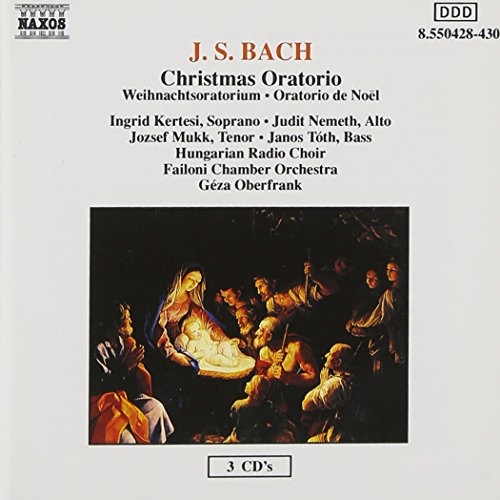1
/
of
2
BACH, J.S.: Christmas Oratorio, BWV 248
BACH, J.S.: Christmas Oratorio, BWV 248
Regular price
$35.99 USD
Regular price
$35.99 USD
Sale price
$35.99 USD
Unit price
/
per
Shipping calculated at checkout.
Couldn't load pickup availability
1 - The first part of the oratorio opens with a jubilant D major chorus, accompanied by an orchestra of three trumpets and timpani, pairs of flutes and of oboes, strings and organ continuo. The chorus, Jauchzet, frohlocket (Christians, be joyful) is adapted from a secular cantata for the birthday of the Princess Electress of Saxony and Queen of Poland, Maria Josepha, first performed on 8th December 1733, T�net, ihr Pauken! (Sound, ye drums!). This triumphant introduction is followed by the words of the Evangelist, taken from the second chapter of the Gospel of St. Luke, introducing the Christmas story. These narrative tenor recitatives from the biblical text serve to link arias, meditative recitatives and choral interludes, with words probably chiefly by Picander, author of the texts of a number of Bach cantatas. The Evangelist's words, accompanied by organ continuo and bass instruments only, are followed by a recitative for alto, accompanied by two oboi d'amore, and a da capo aria, Bereite dich, Zion (Prepare thyself, Sion), for alto with violin and oboe d'amore obbligato, a form in which a repeated first section frames a contrasting central section. The aria is adapted from the secular cantata Hercules auf dem Scheidewege (Hercules at the Crossroads), written in 1733 for the eleventh birthday of Prince Friedrich Christian, son of the Elector of Saxony, whose favor Bach was anxious to court in his differences with the Leipzig city authorities, his employers. The succeeding chorale, Wie soll ich dich empfangen (How should I receive Thee), uses Hans-Leo Hassler's Herzlich tut mich verlangen, with woodwind, strings and organ doubling the voices. The Evangelist announces the birth of Christ in a brief recitative, followed by a chorale, Er ist auf Erden kommen arm (He has come to earth in poverty), to the melody of Gelobet seist du, Jesu Christ (Praise to Thee, Jesus Christ), sung by the soprano soloist, accompanied by two oboi d'amore, a hymn to which the bass soloist adds his own recitative comments. The succeeding da capo aria, Grosser Herr, o starker K�nig, liebster Heiland (Great Lord, mighty King, beloved Saviour), adapted from the secular cantata T�net, ihr Pauken, is sung by the bass, with an accompanying part for trumpet, as well as flute, strings and continuo. The first part of the oratorio ends with the chorale Ach mein herzliebes Jesulein (Ah my heart's beloved little Jesus), to the well known melody of Vom Himmel hoch da komm ich her (From Heaven above I come here), which appears twice again in the second part. 2 - The G major Sinfonia that opens the second part is a traditional pastorale, in the rhythm of the Siciliana, a shepherd dance that had come to be associated with Christmas. The Sinfonia employs pairs of transverse flutes, oboi d'amore and oboi da caccia, with strings and continuo. The Evangelist tells how shepherds were in the fields, watching their flocks, and his brief narrative leads to the chorale Brich an, o sch�nes Morgenlicht (Break now, o beautiful morning-light). The Evangelist resumes the Gospel narrative, joined by the soprano recitative of the Angel, bidding the shepherds not to fear. A bass recitative adds a meditation on the fulfillment of God's promise to Abraham. An elaborately ornamented E minor tenor aria with flute obbligato, adapted from the cantata T�net, ihr Pauken, urges the shepherds to make haste, after which the Evangelist tells them how to recognize the Holy Child. To the appropriate melody of Vom Himmel hoch, there is a further chorale
Share


Product Description:
-
Release Date: October 13, 1992
-
UPC: 730099542821
-
Catalog Number: 8550428-30
-
Label: Naxos
-
Number of Discs: 3
-
Composer: BACH J.S.
-
Orchestra/Ensemble: Budapest Failoni Chamber Orchestra, Hungarian Radio Choir
-
Performer: Ju, Jozsef, Nemeth, Ingrid, Mukk, Kertesi


